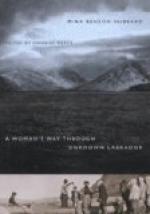A deeper touch of anxiety was added for me by information obtained at Rigolette to the effect that the Hudson’s Bay Company’s steamer, Pelican, my only means of return to civilisation before the closing in of winter, would be at the post at Ungava, my destination, the last week in August. That left us two months to make the journey, which, at the shortest, would carry us across 550 miles of Labrador wilderness. It seemed a great deal to expect, but the men were confident and only eager to be started.
The task of unpacking, rearranging, and completing my outfit was not accomplished when night came. A number of the things I had counted on procuring at the posts were not to be had—the stores being almost empty of supplies. However, M. Duclos and Mr. Cotter of the Hudson’s Bay Company cheerfully raided their own domiciles to supply my lack; substitutes were improvised, and shortly after noon on Tuesday the outfit was completed and loaded into the canoes. To my great satisfaction they were found to carry the load easily, riding well out of the water.
There were two canoes, canvas covered and 19 feet long, 13 inches deep, 34 inches wide, and with each of them three paddles and a sponge. The remainder of the outfit consisted of 2 balloon-silk tents, 1 stove, 7 waterproof canvas bags, one dozen 10 lbs. waterproof balloon-silk bags, 3 tarpaulins, 392 lbs. of flour, 4 lbs. baking powder, 15 lbs. rice, 20 cans standard emergency rations, 12 lbs. tea, 12 lbs. chocolate, 60 lbs. sugar, 20 lbs. erbswurst, 1 oz. crystalose, 4 cans condensed milk, 4 cans condensed soup, 5 lbs. hard tack, 200 lbs. bacon, 14 lbs. salt. There were kitchen utensils—3 small axes, 1 crooked knife, and 2 nets. The outfit of firearms consisted of two rifles, a 45-70 with 60 rounds of ammunition, and a 38-55 with 100 rounds. Each of the men had a 22 cal. 10-inch barrel, single-shot pistol for partridges and other small game. Each also carried a hunting knife, a pair of light wool camp blankets, and an extra pair of “shoe-packs.”




